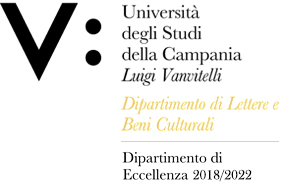Maria FORNARO
Insegnamento di LINGUA E LETTERATURA GRECA
Corso di laurea magistrale in FILOLOGIA CLASSICA E MODERNA
SSD: L-FIL-LET/02
CFU: 12,00
ORE PER UNITÀ DIDATTICA: 60,00
Periodo di Erogazione: Primo Semestre
Italiano
| Lingua di insegnamento | Italiano |
| Contenuti | Le emozioni nella critica letteraria greca. |
| Testi di riferimento | Per chi NON supera il test di auto-valutazione: |
| Obiettivi formativi | • Acquisire competenze linguistiche e filologiche, tali da consentire agli studenti il possesso di un corretto metodo di analisi e di interpretazione critica dei testi letterari prodotti dalla cultura greca antica; |
| Prerequisiti | Conoscenza della lingua greca nei diversi generi ed epoche. Conoscenza della letteratura greca dall'età arcaica a quella tardo-antica. Gli studenti si sottoporranno all'inizio delle lezioni ad un test di auto-valutazione sulla storia letteraria greca (3 quesiti a risposta aperta). Chi non supera il test, deve portare all'esame, oltre al programma svolto in aula, tutta la storia letteraria greca. |
| Metodologie didattiche | 1. Test di autovalutazione sulla conoscenza della letteratura greca (v. 'Prerequisiti'). |
| Metodi di valutazione | 1. Modalità di esame: |
| Altre informazioni | Sono parte integrante del programma le 'Lezioni di letteratura greca a Santa Maria Capua Vetere' (terza edizione) tenuti da docenti esterni. |
| Programma del corso | La domanda alla base dell'itinerario qui proposto è la seguente: quale ruolo svolgono le emozioni in quei testi in cui si danno giudizi sulle opere altrui? Almeno a partire da Gorgia, infatti, la capacità della letteratura di emozionare costituisce la caratteristica più importante del discorso, e del discorso letterario in particolare. Per Aristotele, lo scopo della tragedia è la catarsi delle emozioni. Ma quali sono le strategie narrative e linquistiche gli autori usano per suscitare emozioni nel pubblico? E quali sono le emozioni specificamente 'estetiche', che si provano cioè davanti ad un'opera d'arte?L'itinerario qui proposto è nuovo e lo costruiremo insieme, in un dialogo serrato con i testi, interrogandoci anche su cosa siano le emozioni, che ruolo svolgano nella letteratura, quale consapevolezza della loro importanza nel costruire un'opera d'arte avessero gli autori antichi. |
English
| Teaching language | Italian |
| Contents | Emotions in Greek Literary Criticism |
| Textbook and course materials | or those who do NOT pass the self-assessment test: |
| Course objectives | Acquire linguistic and philological skills that enable students to develop a correct method of analysis and critical interpretation of literary texts produced by ancient Greek culture; |
| Prerequisites | Knowledge of the Greek language across different genres and periods. Knowledge of Greek literature from the archaic to the late antique period. At the beginning of the course, students will take a self-assessment test on Greek literary history (3 open-ended questions). Those who do not pass the test must study the entire history of Greek literature, in addition to the syllabus covered in class, for the exam. |
| Teaching methods | 1. Self-assessment test on the knowledge of Greek literature (see 'Prerequisites'). |
| Evaluation methods | 1. Exam Format: |
| Other information | The 'Lectures on Greek Literature in Santa Maria Capua Vetere' (third edition) conducted by external lecturers are an integral part of the program. |
| Course Syllabus | 1. Exam Format: |








